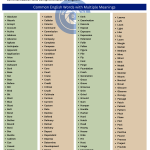Understanding Phrasal Verbs in English Grammar
Phrasal verbs are an important part of English grammar, consisting of a verb combined with one or more particles (either prepositions or adverbs). They often have meanings that are not easily deduced from the individual parts.
What are Phrasal Verbs?
Phrasal verbs are combinations of a verb with one or more particles (prepositions or adverbs) that create a meaning different from the original verb on its own. They are widely used in everyday English and can be challenging for learners because their meanings are often idiomatic and not easily deduced from the
individual words.
Structure of Phrasal Verbs
Verb + Adverb:
- Example: “break down” (stop functioning)
- Sentence: “The car broke down on the way to work.”
Verb + Preposition:
- Example: “look after” (take care of)
- Sentence: “She looks after her younger brother.”
Verb + Adverb + Preposition:
- Example: “put up with” (tolerate)
- Sentence: “I can’t put up with this noise anymore.”
Types of Phrasal Verbs
Phrasal verbs can be categorized into two main types:
Transitive Phrasal Verbs
Transitive phrasal verbs are those that require an object to complete their meaning. The object can be a noun, pronoun, or noun phrase. These phrasal verbs can often be separated by the object when it is a noun, but if the object is a pronoun, it typically comes between the verb and the particle.
- Example: “pick up” (collect)
- Sentence: “Can you pick up the kids from school?”
Intransitive Phrasal Verbs
Intransitive phrasal verbs are those that do not require an object to complete their meaning. They stand alone with just the verb and the particle, conveying a complete thought.
- Example: “show up” (arrive)
- Sentence: “He finally showed up at the party.”
Separable vs. Inseparable Phrasal Verbs
Separable
The object can come between the verb and the particle or after the particle.
- Example: “turn off” (stop a machine)
- Sentence: “She turned off the light.” or “She turned the light off.”
Inseparable
The object must follow the particle.
- Example: “look after” (take care of)
- Sentence: “She looks after her younger brother.”
Common Usage in Daily Communication
Phrasal verbs are commonly used in daily communication, often making the language sound more natural and conversational.
Common Phrasal Verbs and Their Meanings
Get up
- Meaning: To rise from bed.
- Example: “I usually get up at 7 AM.”
Go out
- Meaning: To leave home for a social activity.
- Example: “Do you want to go out for dinner tonight?”
Come back
- Meaning: To return.
- Example: “When are you coming back from your trip?”
Find out
- Meaning: To discover or learn something.
- Example: “I need to find out what time the meeting starts.”
Take off
- Meaning: To remove (clothing); to leave the ground (plane).
- Example: “She took off her jacket.” / “The plane took off on time.”
Look after
- Meaning: To take care of.
- Example: “Can you look after my cat while I’m away?”
Turn on
- Meaning: To start a machine or device.
- Example: “Could you turn on the light, please?”
Turn off
- Meaning: To stop a machine or device.
- Example: “Don’t forget to turn off the stove.”
Pick up
- Meaning: To collect someone or something.
- Example: “I’ll pick you up at 8 PM.”
Put on
- Meaning: To wear clothing.
- Example: “He put on his coat and left the house.”
Give up
- Meaning: To stop trying.
- Example: “Don’t give up on your dreams.”
Run out of
- Meaning: To have no more of something.
- Example: “We’ve run out of milk. Can you buy some?”
Break down
- Meaning: To stop working (for machines).
- Example: “The car broke down on the way to work.”
Show up
- Meaning: To appear or arrive.
- Example: “He showed up late to the party.”
Look for
- Meaning: To search for.
- Example: “I’m looking for my keys. Have you seen them?”
Hang out
- Meaning: To spend time relaxing or socializing.
- Example: “Do you want to hang out this weekend?”
By regularly practicing and immersing yourself in environments where phrasal verbs are used, you’ll become more familiar with their meanings and applications, making your English more fluent and natural.





